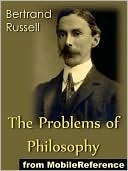More on this book
Community
Kindle Notes & Highlights
Experience might conceivably confirm the inductive principle as regards the cases that have been already examined; but as regards unexamined cases, it is the inductive principle alone that can justify any inference from what has been examined to what has not been examined. All arguments which, on the basis of experience, argue as to the future or the unexperienced parts of the past or present, assume the inductive principle; hence we can never use experience to prove the inductive principle without begging the question. Thus we must either accept the inductive principle on the ground of its
...more
Knowledge is called empirical when it rests wholly or partly upon experience. Thus all knowledge which asserts existence is empirical, and the only a priori knowledge concerning existence is hypothetical, giving connexions among things that exist or may exist, but not giving actual existence.
Let us consider, say, such a notion as justice. If we ask ourselves what justice is, it is natural to proceed by considering this, that, and the other just act, with a view to discovering what they have in common. They must all, in some sense, partake of a common nature, which will be found in whatever is just and in nothing else. This common nature, in virtue of which they are all just, will be justice itself, the pure essence the admixture of which with facts of ordinary life produces the multiplicity of just acts. Similarly with any other word which may be applicable to common facts, such
...more
Philosophical knowledge, if what has been said above is true, does not differ essentially from scientific knowledge; there is no special source of wisdom which is open to philosophy but not to science, and the results obtained by philosophy are not radically different from those obtained from science. The essential characteristic of philosophy, which makes it a study distinct from science, is criticism. It examines critically the principles employed in science and in daily life; it searches out any inconsistencies there may be in these principles, and it only accepts them when, as the result
...more
When, however, we speak of philosophy as a criticism of knowledge, it is necessary to impose a certain limitation. If we adopt the attitude of the complete sceptic, placing ourselves wholly outside all knowledge, and asking, from this outside position, to be compelled to return within the circle of knowledge, we are demanding what is impossible, and our scepticism can never be refuted. For all refutation must begin with some piece of knowledge which the disputants share; from blank doubt, no argument can begin. Hence the criticism of knowledge which philosophy employs must not be of this
...more
This highlight has been truncated due to consecutive passage length restrictions.


